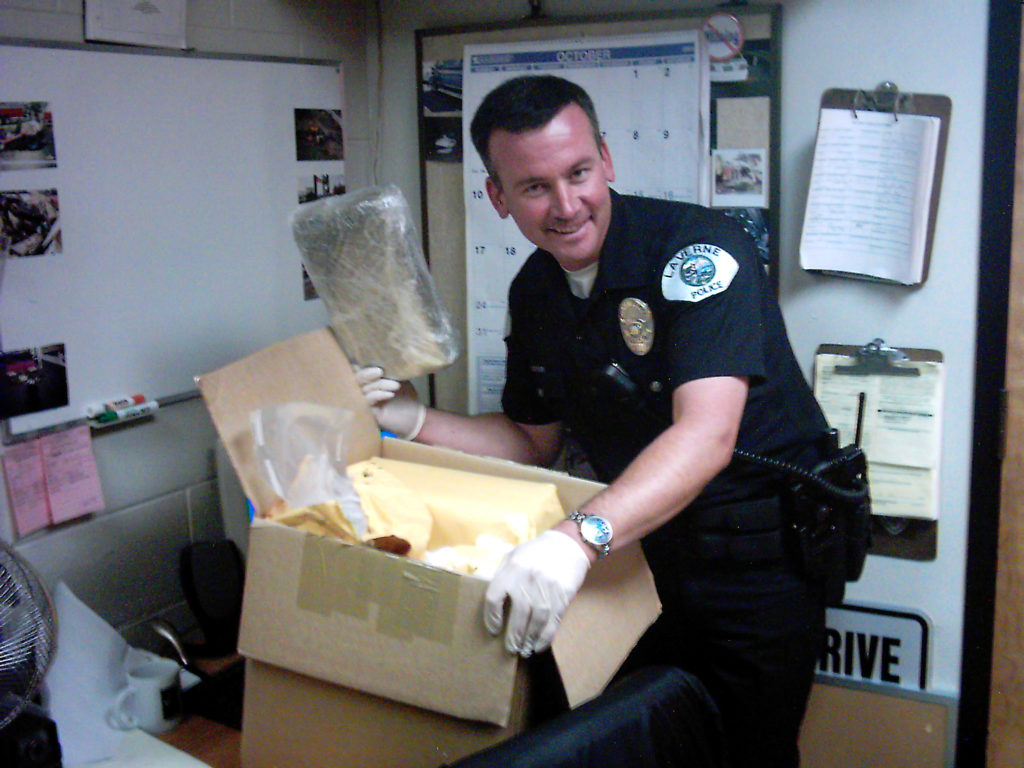
Keith Garwick intercepts 10 kilos of illegal weed infiltrating the city.
Among the many questions the La Verne electorate will be faced with on March 7 is, does it want a West Point graduate and Gulf War Silver Star winner, who also served on the La Verne police force for 14 years and now conducts forensics classes at Bonita, Lutheran and the Mt. Baldy ROP, to serve on its city council.
Could his skills as a former tank commander in Desert Storm prove beneficial in helping our city do combat against a host of nagging problems, such as balancing the budget, stimulating more economic development, curbing crime and relieving our increasingly crowded streets.
For answers, LaVerneOnline sat down with the decorated war hero and recently retired police officer. He didn’t answer our call in cadet grays or police blues, but in a Stetson and sunglasses. When the questions started to fly, he was ready with the heavy artillery of thoughtful articulation, thoroughly prepared and never once pulling rank on his civilian interrogator.
To know Keith is to know he is his father’s son, also a West Point graduate. He was born in Hawaii, but from an early age, he learned what it was like to be uprooted and displaced, at different times, to Fort Lejeune in North Carolina, the Marine Corps Base Quantico in Virginia and Camp Pendleton in California.
“You don’t think in terms of leaving your friends because you’re always moving to someone or something,” Keith said, alluding to the larger adopted military family that members of the U.S. armed forces find themselves a part of.
Accordingly, when he was high school age, his parents were transferred to Norway, which presented him with a life-changing decision: Do I live with my parents and attend an international baccalaureate school in Norway or do I attend boarding school in London with no parents. “The choice was pretty simple,” he said about selecting London.
After high school, he attended West Point, continuing the family tradition. Although he majored in a physics and engineering curriculum, it wasn’t all work and no play for Keith. In his class, he started courting Shari, who would become an intelligence officer and his future bride.
On the move
After graduation in 1988, Keith was commissioned as a cavalry officer in the 2nd Armored Cavalry, just outside of Nuremberg, Germany, tasked with gathering information on the Soviets and East Germans. Because of the outbreak of the Gulf War (marked by Iraq’s invasion of Kuwait) in 1990, he wasn’t there long.
“The most improbable thing happened,” Keith said. “For the first time in 50 years my regiment moved.”
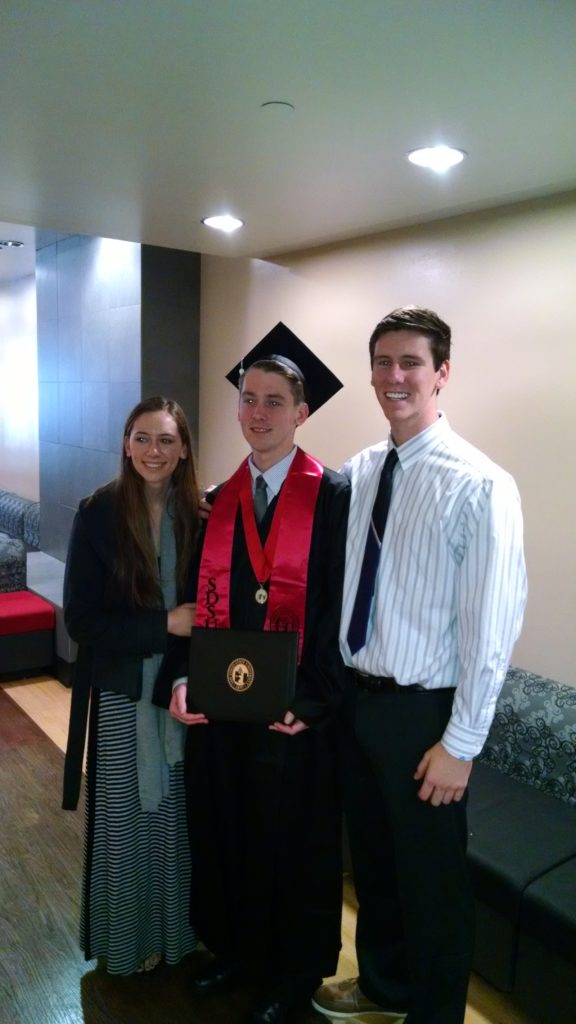
Keith’s oldest son, San Diego State graduate Todd Garwick (center), set the educational bar high for his sister, Rachel, and brother, Kyle.
In late 1990, he and his unit were unpacking their four tanks and six Bradley infantry fighting vehicles (IVFs) in Saudi Arabia, part of a U.S. military buildup that eventually reached 500,000 American troops. In February 1991, the ground phase of the war began, which included Keith’s unit that rolled 300 miles behind the Iraqi forces to help create a northern flank. After the Marines and coalition forces attacked from the south, the Iraqis fled right into the jaws of the 2nd armored cavalry. In about 96 hours, the United States and its allies had declared victory.
“It was one of the most lopsided military engagements ever,” said Keith, who was awarded the Silver Star, the United States military’s third-highest decoration for valor in combat.
With Desert Storm in the history books, his unit returned to Germany and was disbanded. He accepted a new assignment in Fort Irwin outside of Barstow, Calif., to teach Russian-style fighting tactics in desert warfare. Meanwhile, Shari, now his wife, lived in Barstow and began working for the Zellerbach Paper Company. When her job took her to San Francisco, Keith joined her and Zellerbach.
They soon relocated to Los Angeles, both putting their science, technology, engineering and math (STEM) backgrounds to work, helping companies construct water distribution systems. The money was good, but the work didn’t fill them with the same purpose or sense of accomplishment as public service. So on September 11, 2001, Keith thought seriously about recommissioning with the U.S. Army and began making arrangements through the office of Barbara Boxer, the U.S. senator from California. Shari, however, worried that the move would be hard on the kids.
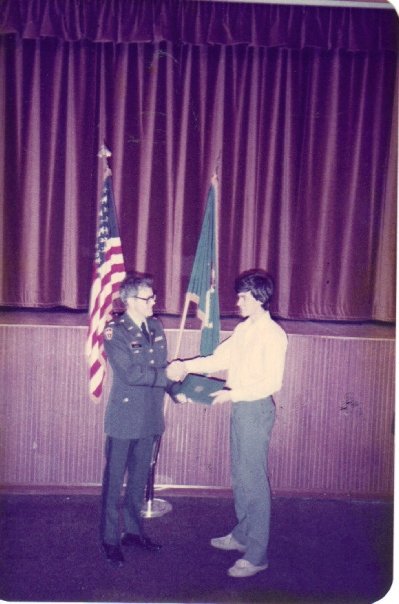
Keith accepts his 1984 appointment to West Point.
For Keith, who grew up a Marine brat, an officer’s nomadic life simply came with the job.
Shari had a different notion, telling her husband, “You may have grown up that way, but the kids didn’t.”
Officer Garwick
Her argument hit home because Keith found another public service outlet, the La Verne Police Department, which he joined in 2002 and served until 2015. Five of those he spent as a school resources officer at Bonita High School.
“I really got to know those kids,” Keith said proudly. And the ones that required that extra special attention, he gave it to them.
“If somebody is doing high-risk behavior, something else is going on in their lives,” Keith said. “That’s what needs to be addressed and that was my approach.”
But what will be Keith’s approach if he’s asked to serve as a city council member — in particular, what will his management style be like, as well as the values and priorities that he wants to advance?
“Public service has always been my calling, either as a soldier, a police officer or a teacher,” Keith said. “Nobody does those things for the money. This training, experience, and insight have been my guide-post ever since.”
The Campaign
Speaking of money, he is running his campaign on a $2,000 budget, a shoestring funded among others by five other West Point classmates whom he discovered also live in La Verne. He’s been designing his own fliers on his home computer and his own yard signs with a recently purchased laser engraver. “I recommend it,” he said mischievously. “You’ll enjoy watching the sparks and smoke.”
Describing himself as someone who hates “concepts that are abstract,” Keith has distilled his campaign into four points: family, community, growth and stewardship.
To illustrate the principle of “stewardship” that he wants to convey to voters,, he’s passing out seeds that if planted will grow into mighty carob trees.
“I started thinking about what does stewardship looks like,” he said, beginning to explain the symbolism he associates with the carob tree. “You plant them, but you’re not going to see the fruit for 25 years. Carob trees live at least 500 years, and, in fact, the oldest living tree in La Verne is a carob tree in Kuns Park.
“Stewardships is something you do now, but it’s not going to benefit you; it’s going to benefit your children, your grandchildren and your great grandchildren.”
As for his own offspring, he’s cultivated a pretty good crop of seeds. Todd, 23, graduated from San Diego State with a degree in business. Kyle, 21, is at West Point, and Rachel, 18, is pre-med at UC Santa Barbara.
If his campaign literature had been a pentagon instead of rectangle, he might have added “preparation” or “preparedness” as a fifth value to his platform.
When he was an instructor at Fort Irwin, he found some of his men preparing to deploy without water for a multi-day training mission in the desert. Their excuse had been they were going to fill the tanks at a known water source later in the day. Keith ordered them to start filling their tanks at the base.
“I was low in the officer ranks,” Keith said, “but high enough to know that sending guys into the desert without water was a bad idea.”
Today, Keith wants La Verne to have that same common-sense level of preparedness or readiness, whether the city is confronted with a mass school or workplace shooting, a natural disaster or a budget crisis.
“You can’t have a knee-jerk reaction; you already need a solid plan in place,” he said.
In the event of an earthquake, he said Bonita is well prepared to serve as a triage center, before cautioning that “even having stocked more than 2,000 pounds of foods and other supplies might not be enough.”
“How much food or medical aid can one place supply?” he asked. “The Northridge quake taught people that you might be on your own for days.”
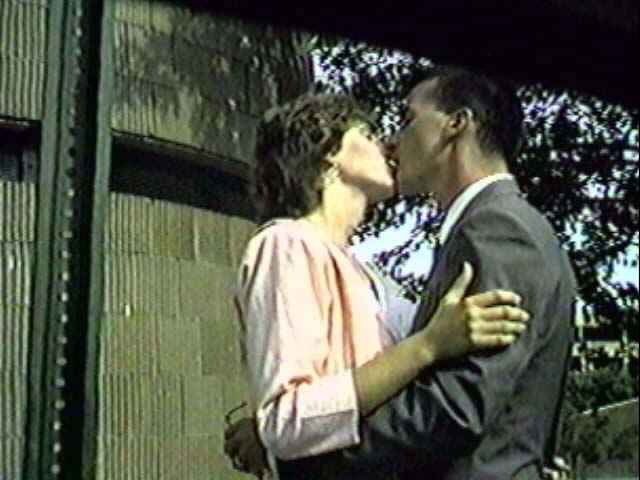
Shari and Keith share a wedding day kiss.
The Platform
So, as a member of the council, he would call on his planning, tactical and strategic training to advocate increasing communication throughout the city to augment the public’s disaster awareness and means of self-sufficiency. “I’m not asking you to dig a bomb shelter, just to ensure you have water, flashlights, batteries, and other essential emergency supplies on hand to get you through a crisis,” he said.
In the same way, he believes the city needs to continue expanding its economic diversity in the event of an economic disaster.
“This may not be a popular answer, but I’ll give it to you anyway,” Keith said. “Our economy in the city is extremely homogenous. We have a lot of the same things, pizzerias, four grocery stores, etc. That’s fine, but if there is a huge economic change in technology, that change could really wipe out a huge area of commerce instantaneously.”
Keith would be the last to tell you he has all the answers, but he does come prepared with lots of questions, echoing Eric Schmidt, the former Google CEO, who said, “We run the company by questions, not answers.”
Keith also believes that the best organizations encourage dissent and self-examination.
“If you look at an organization that is always agreeing, you’re looking at an organization that is in trouble,” he said.
Keith further pointed to the tank training he received from the Israelis as the way he would tackle problems and reach solutions.
“They have a unique practice,” he said. “In the planning phase, every person in the unit has a say. I don’t care if you’re the cook or the general, everybody has a chance to speak, and if an idea doesn’t get voiced because you were afraid to speak up, then it’s shame on you.
“Nobody has a monopoly on a good idea.”
Two priorities that Keith is especially keen on are transportation safety and the city budget. He doesn’t think radical fixes are required, but cautioned that “even Bradleys and tanks need tuning-up from time to time.”
First, as a father of three children whom he taught to drive and as a former transportation officer, he believes the city has to do everything in its power to mitigate transportation risks on our streets, underscoring that the last transportation study the city undertook was completed about 20 years ago. “If any of the data is still correct, it’s strictly an accident. It’s a broken clock that’s right twice a day,” he said.
Interestingly, he also believes the city should reexamine its current commitment to maintaining its own police force, given that the city has continued to run budget deficits over the past several years. He notes that La Verne pays about $750 a person to provide public safety while San Dimas pays about $250 a person, a $500 per capita gap between the two cities.
He added that making the comparison is valid because La Verne and San Dimas are similar in size, demographics and geographic location.
“Do we in La Verne get a better response and do we have more control over the police? ” he asked. “Undoubtedly, but are we willing to pay that much more, and are the citizens even aware of what they’re paying.”
Because public safety makes up the lion’s share of the city budget, Keith wants the public to understand what it’s paying for, rather than just treating the payment like the cable bill, “that just kind of keeps coming and you never really look at it.”
Keith is definitely looking, but while he emphasizes that he doesn’t have a position, he clearly wants the city to have the conversation. “A friend told me once that when you buy things, you can have them fast, cheap and good, but you get to pick only two.”

Keith helps recruit other West Point candidates.
Love of La Verne
Keith has had the opportunity and the privilege of seeing the world, but it’s his discovery and connection with La Verne that he feels has been one of his most meaningful journeys.
“I ran into La Verne and fell in love with the place,” he said. “When I have family and friends visit, they say, ‘I’m so lucky,’ and I say, ‘No, luck is what happens when preparation meets opportunity.’ Well, that’s La Verne. We are preparing ourselves for opportunities.”
According to Keith, those opportunities are a blend of new and old, the coming of the Gold Line and Gilead and the growing strategic importance of Brackett Airport.
“The resources that we have available to us here in the southland and in La Verne – the academic, the scientific, the programs and activities for young and old – are unmatched anywhere in the state,” Keith said.
As a police officer and war veteran, Keith has seen his share of both good and bad, but it’s the good from which he appears to draw limitless inspiration.
From his army days, he recalled unpacking the tanks and Bradleys that had been delivered to Germany from FMC Tanks in San Jose, Calif. After he and his crew carefully removed the shrink wrap and crates containing the parts and tools that the military equipment came with, they found at the bottom of the containers bags and bags of candy and stacks of canned spam, accompanied by personal notes from the workers who had built and inspected the fighting machines.
“There were notes from families describing how they double-checked the engines and gunsights to ensure they were perfect, knowing these things were going to keep us alive or kill us.”
Keith has been a player on the world stage, but he believes it’s the little things and signs of respect that a person can demonstrate on a daily basis, especially at the local level where family and community meet, that constitutes real leadership.
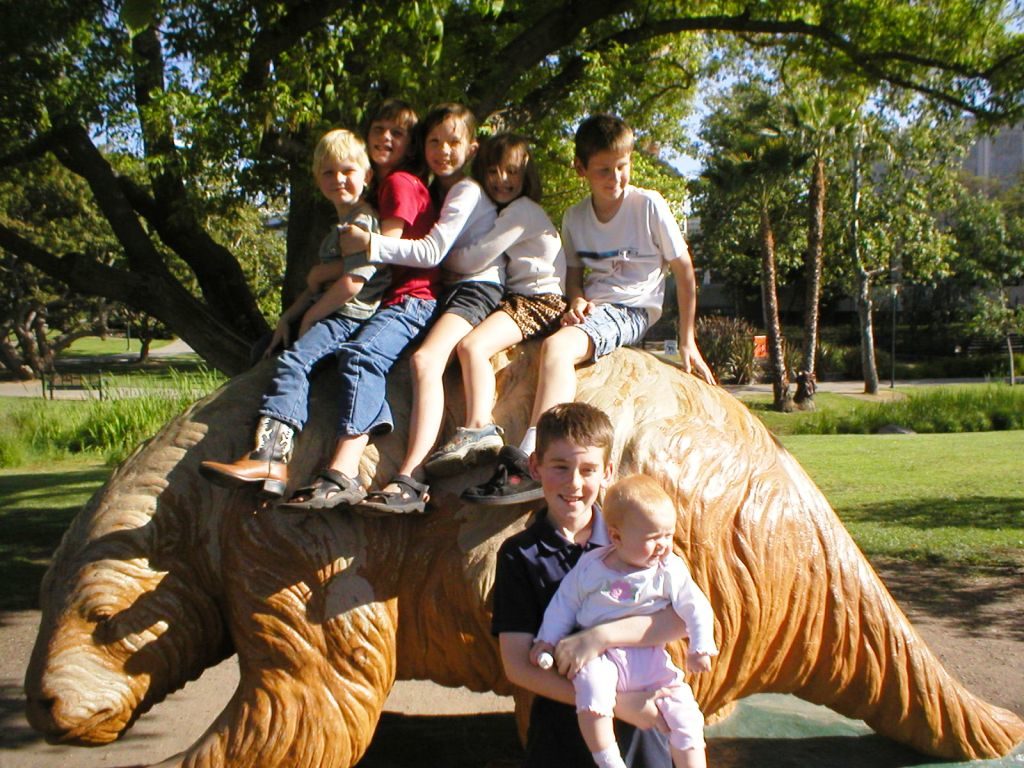
For Keith, success and fulfillment starts and ends with family, which her includes the Garwick kids and cousins on the Tarpit sloth.



Leave a Reply